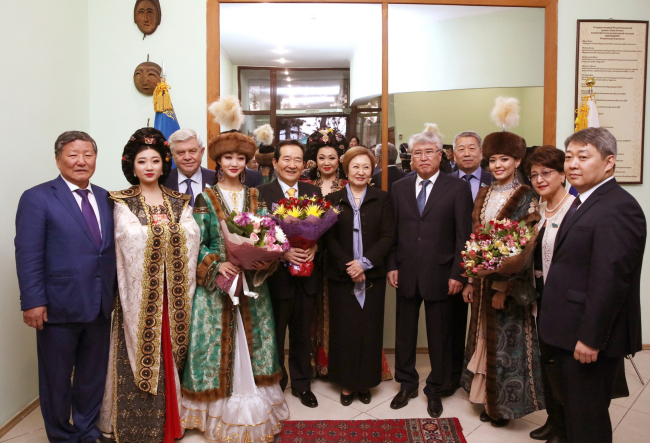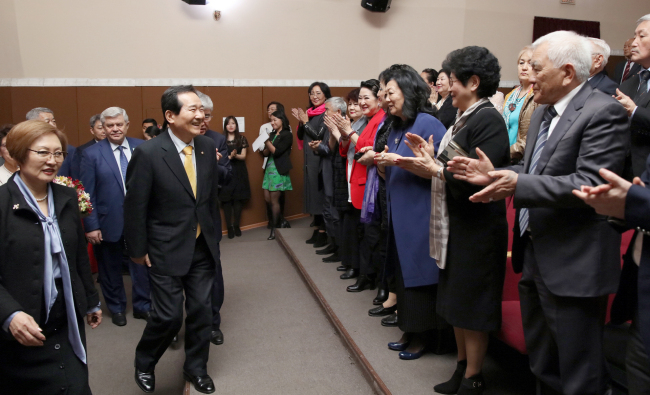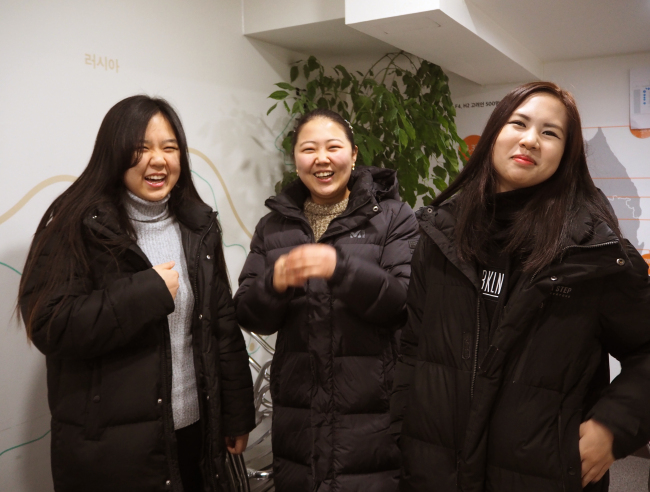Koryoin, living precariously in Korea
“The Koryoin children, who are ingrained with the cultural and linguistic sensibilities of both societies, have the potential to play a huge role in bridging Korea and Eurasian countries.”
By Joel LeePublished : March 19, 2018 - 17:15
When South Korean National Assembly Speaker Chung Se-kyun arrived at the Koryo Theater in Almaty, Kazakhstan on March 11, he was met by a warm reception from ethnic Koreans in Central Asia, known as “Koryo saram,” or “Koryoin.”
“It still pains me to think about the plight of our ancestors, who were jettisoned like baggage here in Kazakhstan after they were forcibly transported on cargo trains some 80 years ago,” the politician said, referring to their mass relocation from Russia’s Far East in 1937 under Joseph Stalin’s forced migration policy.
In front of a crowd of enthusiastic Koryoin -- meaning the people of Korea -- as well as Kazakhstani politicians of Korean ethnicity, he added, “Under such difficult times, the Kazakh people warmly embraced Koryoin, and Koryoin overcame their hardships using their characteristic willpower and passion, reaching their heights today. I convey my deepest respect and gratitude to them.”
While the ethnic Koreans call themselves Koryo saram, they are referred to as Koryoin in South Korea.
“It still pains me to think about the plight of our ancestors, who were jettisoned like baggage here in Kazakhstan after they were forcibly transported on cargo trains some 80 years ago,” the politician said, referring to their mass relocation from Russia’s Far East in 1937 under Joseph Stalin’s forced migration policy.
In front of a crowd of enthusiastic Koryoin -- meaning the people of Korea -- as well as Kazakhstani politicians of Korean ethnicity, he added, “Under such difficult times, the Kazakh people warmly embraced Koryoin, and Koryoin overcame their hardships using their characteristic willpower and passion, reaching their heights today. I convey my deepest respect and gratitude to them.”
While the ethnic Koreans call themselves Koryo saram, they are referred to as Koryoin in South Korea.

Noting that Astana and Seoul have closely cooperated since establishing diplomatic relations in 1992, Chung vowed he will put his utmost efforts to strengthen the ties for the benefit of both countries.
At the venue, where traditional musical and cultural performances by Koryoin were showcased, Bojko Vladimir Karpovich, deputy speaker of Kazakhstan’s Mazhilis Lower House Parliament, said, “Kazakhstan’s ethnic Koreans call themselves ‘Koryo saram,’ and they are inseparable from our nation. They are a living bridge between our countries.”
Eighty-one years have passed since 1937, when some 172,000 ethnic Koreans in Russia’s Far East -- the Maritime Province bordering China and North Korea -- were hauled across the Eurasian hinterland to arrive at various destinations in Central Asia. Traveling on open-air trains designed for carrying livestock, many people, including young children and women, died on the 6,000-kilometer journey.
A large number of ethnic Koreans had lived in towns and cities in the Maritime Province prior to their forced relocation, particularly the city of Ussuriysk some 11 kilometers north of Vladivostok, which served as the command post for independence fighters in their struggle against Japanese colonialists.
While many Koryoin from Uzbekistan have resettled in Korea since the 1990s due to the worsening Uzbek economy, those in Kazakhstan mostly remained, with some 100,000 making strides in diverse fields.
There are an estimated 60,000 Koryoin in South Korea when including those missed by official statistics, according to some estimates. Their numbers, tallied at around 50,000 officially, are on the increase. Of them, some 12,000 live in Ansan, Gyeonggi Province, 6,000 in Asan and Cheonan, South Chungcheong Province, 4,000 in Incheon and 3,000 in Gwangju.

“The reason why I came to Korea was to learn more about the culture and language of my ancestors’ homeland,” said Elena Tsoy, a 21-year-old university student who arrived here in 2015 from Uzbekistan, in an interview at the Koryoin Cultural Center in Ansan.
“I started learning the Korean language in middle school, and followed my parents to Korea. I love my life here and the company of my Korean friends at university,” the fourth-generation Koryoin added in accented Korean.
Tsoy, who works part-time at the center that provides Korean language training and settlement-related counselling, said most Koryoin in high school or younger are from the fourth-generation, meaning they are legally classified as foreigners rather than as overseas Koreans. Many foreign nationals with Korean backgrounds can receive an F-4 visa that lets them reside and work here. But the fourth or fifth-generation are not entitled to the same status, and once they are adults, must leave the country every three months to return to their homeland and renew their visa.
“Korea is a good country to live and work in, because the salary is much higher than in Uzbekistan,” she said. “The fourth-generation Koryoin have spent their youth here, and will have a hard time even after starting a new life in Uzbekistan.”
The special law on Koryoin was enacted in 2013 to support the livelihood and settlement of those abroad, excluding those already in Korea. A proposal to amend the legislation to allow fourth, fifth and sixth generation Koryoin to obtain F-4 visas was motioned last year at the National Assembly, but not much progress has been made, insiders pointed out.
The Korean government has issued temporary F-1 visas to the fourth-generation Koryoin residing here with their parents, which allows them to live in the country through June next year, while obviating the need to return home every three months.

Kim Jin-young, the secretary general at the center, said the biggest problems facing Koryoin here are their precarious legal status and lack of Korean language competency.
Because most Koryoin parents work temporary jobs in construction, manufacturing and farming, they leave for work early in the morning and come back home late at night, according to Kim.
They also don’t have much time to practice Korean at work. “As their status here is unstable, they also don’t feel the need to invest much time and energy in learning Korean,” she said.
Kim said many Koryoin came to Korea from Uzbekistan in search of a better life, once making up to 90 percent of the Koryoin population here. Following that, the Russian economy started wobbling with falling oil prices in 2014, impacting the Russia-linked Kazakh economy as well. Ukraine’s economy, too, has been reeling from the perennial conflict with Russia. Altogether, it has led to more and more Koryoin entering Korea.
Kim urged the government to provide minimum support for their stable status, attentive education and child care. If the Koryoin children fail to put down roots here, South Korea as a whole fails to develop as a mature and democratic multicultural society, she contended.
“The Koryoin children, who are ingrained with the cultural and linguistic sensibilities of both societies, have the potential to play a huge role in bridging Korea and Eurasian countries,” argued the secretary general.
“It is absolutely vital to make them feel proud about being Korean. But currently our school system and society have largely neglected them in that regard, in the pursuit of parochial, discriminatory and exclusionary habits. As witnessed in failed integration experiences of many societies around the world, it could backfire.”
By Joel Lee (joel@heraldcorp.com)








![[Graphic News] More Koreans say they plan long-distance trips this year](http://res.heraldm.com/phpwas/restmb_idxmake.php?idx=644&simg=/content/image/2024/04/17/20240417050828_0.gif&u=)
![[KH Explains] Hyundai's full hybrid edge to pay off amid slow transition to pure EVs](http://res.heraldm.com/phpwas/restmb_idxmake.php?idx=644&simg=/content/image/2024/04/18/20240418050645_0.jpg&u=20240419100350)





![[From the Scene] Monks, Buddhists hail return of remains of Buddhas](http://res.heraldm.com/phpwas/restmb_idxmake.php?idx=652&simg=/content/image/2024/04/19/20240419050617_0.jpg&u=20240419175937)

![[KH Explains] Hyundai's full hybrid edge to pay off amid slow transition to pure EVs](http://res.heraldm.com/phpwas/restmb_idxmake.php?idx=652&simg=/content/image/2024/04/18/20240418050645_0.jpg&u=20240419100350)

![[Today’s K-pop] Illit drops debut single remix](http://res.heraldm.com/phpwas/restmb_idxmake.php?idx=642&simg=/content/image/2024/04/19/20240419050612_0.jpg&u=)